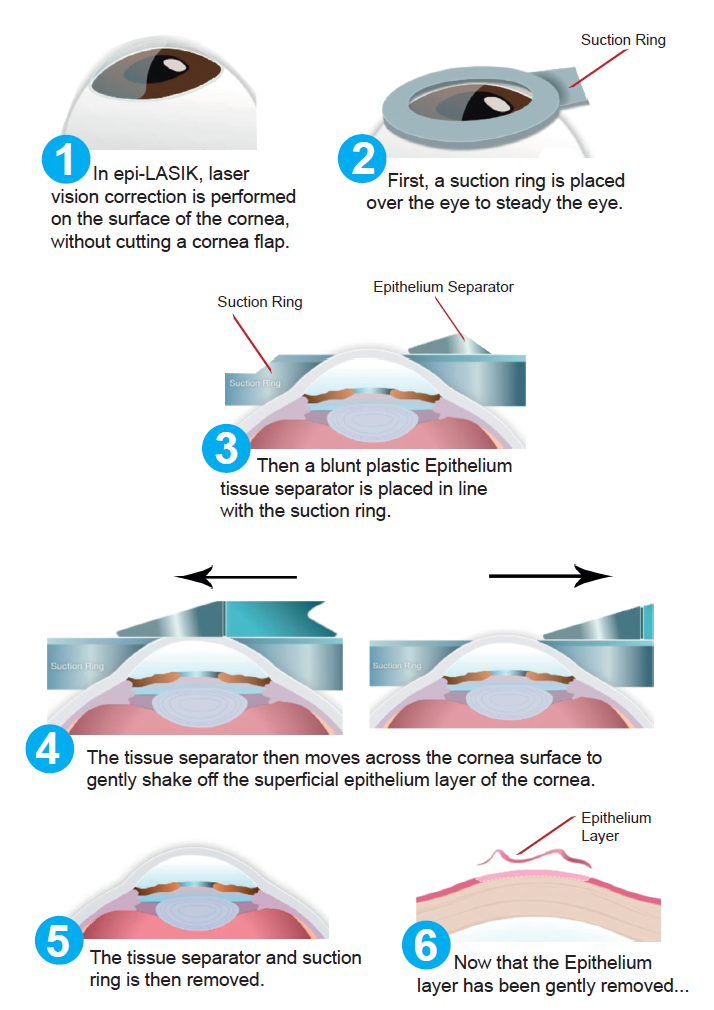Did you know?
Top 10 questions about lasik & epi-lasik
1. What is LASIK?
LASIK stands for Laser Assisted In-Situ Keratomileusis. It is widely recognised as the procedure of choice for correcting most cases of myopia. In selected cases, it can also be used to correct mild to moderate degrees of astigmatism and farsightedness. LASIK is sometimes called the “flap and zap” procedure.
LASIK (Flap method): During the LASIK procedure, a cut is made across the cornea such that a flap is created leaving a small area still attached to allow the flap to be replaced later on. Upon creating the flap, it is lifted and laser correction is applied on the underlying surface. The flap will then be re-positioned without any form of stitches except for the balance intact tissue. This creates the risk of flap dislodgement, debris being embedded under the surface and dry eyes as the nerves are being severe during the process of cutting the flap. In addition, a lot of good healthy cornea tissues are being wasted to create the flap, which instead, can actually be used to correct a higher myopic power should the need arise. For those with thin cornea, it may be the tipping point to cause cornea instability problem in the future.
2. What is epi-LASIK?
Epi-LASIK is the safer, surface based LASIK.

Epi-Lasik (without flap method): During the Epi-Lasik, a minimally invasive surgical procedure is performed which does not involve the cutting of a flap and therefore, more cornea tissues can be preserved. The structure of the cornea will remain strong since no damage is done by cutting. Epi-Lasik only involves a fast vibrating blade that removes the outermost thinnest layer of the cornea known as the epithelium and the laser will then be applied on the underlying tissue to correct your degree. The epithelium will then grow back on its own after 3-5 days. As such, Epi-Lasik avoids the danger of cutting a cornea flap that is well demonstrated to be the most complication prone step of the Lasik procedure. Epi-Lasik preserves more cornea tissue and is thus better suited for those with thin cornea of high myopia and astigmatism where more cornea tissue needs to be removed. Your cornea is the most sensitive part of your whole body and has thousands of nerve endings. These endings are cut during Lasik which causes or worsen dry eyes. In some cases, dry eyes after Lasik is permanent. Epi-Lasik does not cut cornea nerves and is much less likely to cause or exacerbate dry eyes. Epi-Lasik is the military approved Lasik procedure as there is no risk of the cornea flap dislocating. For those who are in active vocation or sports, like commanders, navy divers, airforce pilots, nautical experts, rugby and soccer players etc, Epi-Lasik is the safer choice.

3. Should I choose epi-LASIK if I am suitable for LASIK & epi-LASIK?
You should choose epi-LASIK if:
#1 You DO NOT want to CUT your cornea.
#2 You DO NOT want to SUFFER from the medical complications related to this created cornea flap.
#3 You WANT to preserve cornea structure and maintain cornea’s strength by preventing weakening as much as possible.
#4 You want to be able to rub your eyes hard without fear of cornea damage.
#5 You cannot wear spectacles or contact lens for OCCUPATIONAL REASONS and have been found unsuitable for LASIK treatment due to high myopia/thin cornea etc. (e.g. Fireman, Airlines Cabin Crew, Oil Rig Worker, Military).
#6 You are an ACTIVE SPORTSPERSON who do not want to fear cornea flap dislodgment during contact sports.
#7 You DO NOT want to live with long-term side effect of DRY EYES caused by LASIK.
#8 You WANT to preserve precious cornea tissues in preparation for possible upgrade surgeries in the future as your eyes age naturally.
#9 You WANT to enjoy TRUE FREEDOM and SAFETY in your lifestyle, sporting, adventure and traveling pursuits without fear of cornea flap dislodgement, dry eyes and thin cornea risks.
#10 (If you cannot do LASIK) You CORNEA is TOO THIN and you have been rejected and turned away from doing LASIK
#11 (If you cannot do LASIK) You have HIGH MYOPIA and have been rejected from doing LASIK
4. Is it advisable to go for epi-LASIK if I have XXX degree?
There is no minimum power for epi-LASIK. Usually, people having 100 degree and less can still see without glasses. They might not choose to go for surgery.
The maxim power epi-LASIK can correct is up to 1200 degrees. However, it is highly subjected to corneal thickness and shape. You may schedule a quick screening to confirm the suitability.
Usually taking this surgery is a personal choice. For people with high degree, they are more likely to go for the surgery because they will be able to take off their thick glasses.
5. What is the minimum age suitable for epi-LASIK?
The minimum age for epi-LASIK is 18~21 years old where our eye power has become stabilized.
6. Will short-sightedness come back after the treatment?
There is a risk for myopia to come back and this highly depends on individual’s life style. Good eye care habits are still very important and we will share about the eye care tips on our Facebook Page in the future. Like our page & Stay tuned! Usually, when people reach 21, the eye power will become stabilized. The chance of having the degree coming back will be less too.
7. Can I correct the degree if I have short-sightedness and long sightedness (presbyopia or Lao Hua) at the same time?
Yes, epi-LASIK can help to ease the usage of reading glasses and correct myopia at the same time via monovision, however, 老花 (presbyopia) will increase with age, you will probably need reading glasses in future.
8. I am pregnant. I’m breast-feeding my baby now, how long do I’ve to wait before I can correct my eye sight?
You can correct them as soon as you have stopped breast feeding. This is because we do not want the eye drops used after the surgery to be passed on to baby.
9. May I claim Medisave for epi-LASIK?
Medisave is not claimable as LASIK is considered as an aesthetic surgery.
10. What is the cost of epi-LASIK?
Please find the prices here.
*Price Excludes GST
Do you have any questions regarding LASIK, EPI-LASIK and other eye related concerns? We would be happy to answer all your concerns, head over to our contact us page to submit your questions and we will answer your questions as soon as possible.
And don’t forget to join our Facebook Page to get the latest updates!








